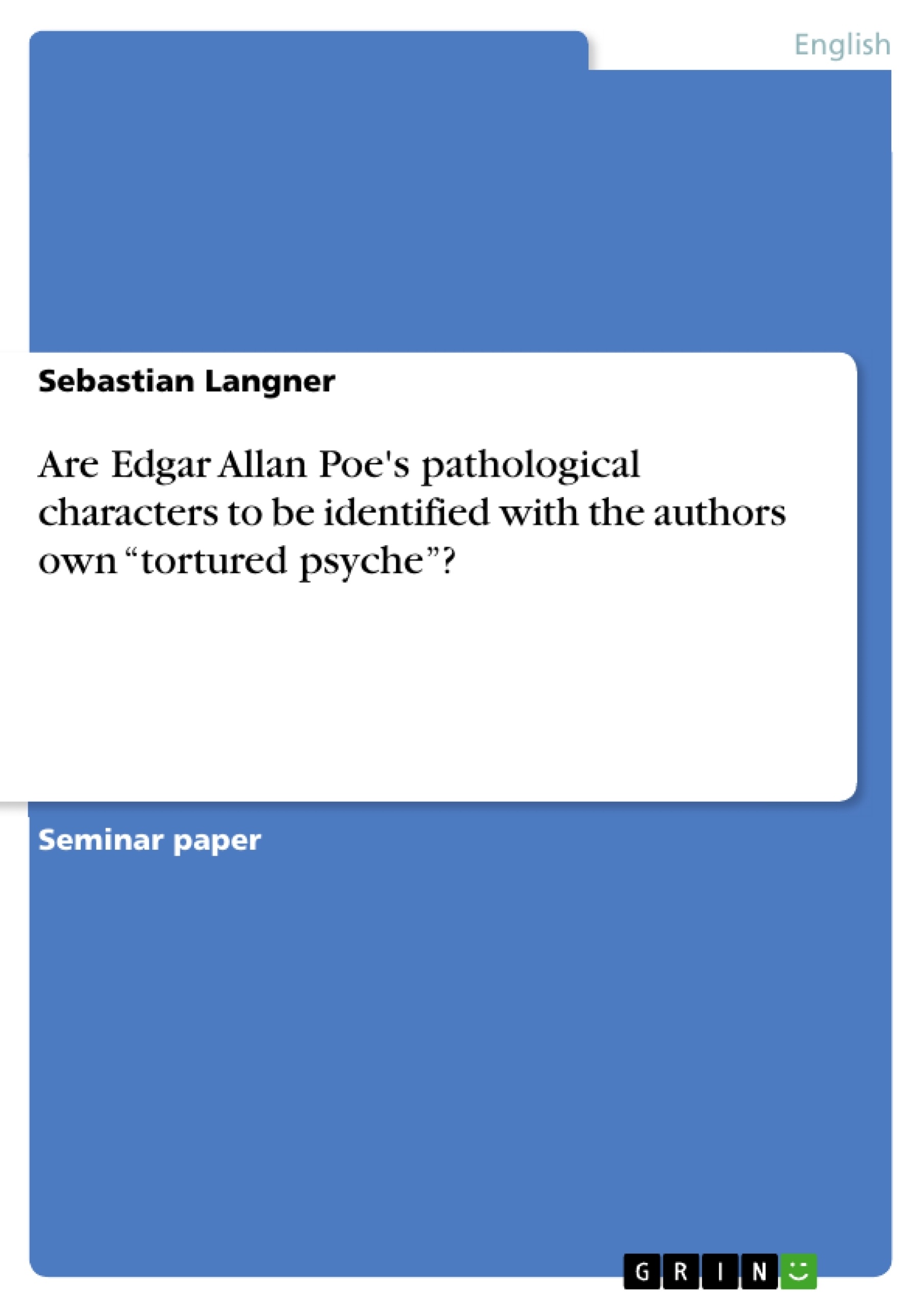In 1960, Leslie A. Fiedler published his most influential and controversial book “Love and Death in the American Novel”. Elaborating on a theory he had developed as early as 19481, Fiedler proclaimed his thesis of an “innocent interracial homosexuality”and the generally dysfunctional treatment of American authors of the love between man and woman.
In contrast to the New Criticism-school that had been prevailing until the 1940s, and saw the text alone as the sole basis for literary criticism, Fiedler tries to incorporate biographical information on the author and insights in his sociocultural environment into his analysis.
Surprisingly, his examination of Edgar Allan Poe's oeuvre turns out as curtly as it is simplifying. He stylizes Poe as the dark side of the American dream, a depressed and depressing madman, incarnating his fantasies into stories of dubious merit. Being an ardent opponent of the New Criticism-school, Fiedler cannot help but relate the choice of Poe's themes and characters solely to the author himself, stating that “in Poe the incest theme belongs to the private world of his own tortured psyche […].” For Fiedler, “The odd syndrome of child -love, necrophilia, and incest in Poe is too personal and pathological to shed much light on the general meaning of the latter theme in American literature and life.”4 Instead of treating Poe as a singularity worth further analysis, he dismisses the author's work as the questionable fancies of a mentally deranged.
But the indisputable recurrence of the above-mentioned themes in Poe's work begs the question: Is Leslie Fiedler right? Are Poe's pathological characters to be identified with the author and his own “tortured psyche”?
To answer that question, and possibly to rebut Fiedler's theory will be the aim of this paper.
Inhaltsverzeichnis (Table of Contents)
- Introduction
- "Love and Death in the American Novel" - Fiedler's Poe
- Poe's Narrators or Narrating Poe?
- Conclusion
- Bibliography
Zielsetzung und Themenschwerpunkte (Objectives and Key Themes)
This paper aims to explore Leslie Fiedler’s assessment of Edgar Allan Poe’s work, specifically focusing on his depiction of love and death within the American novel. The paper will critically analyze Fiedler’s arguments regarding Poe’s "The Narrative of A. Gordon Pym" and its implications for understanding Poe’s thematic preoccupations.
- Fiedler’s theory of "innocent interracial homosexuality" in American literature
- The relationship between Poe's themes and his personal psychology
- The role of archetype and signature in interpreting Poe's work
- The American dream as a central motif in Poe’s writing
- The representation of love and death in Poe's narratives
Zusammenfassung der Kapitel (Chapter Summaries)
- Introduction: This chapter introduces the topic of love and death in American literature, focusing on the work of Edgar Allan Poe. It highlights the contrasting perspectives of Poe himself and Leslie Fiedler, who saw Poe as a representative of the dark side of the American dream.
- "Love and Death in the American Novel" - Fiedler's Poe: This chapter delves into Fiedler’s analysis of Poe’s "The Narrative of A. Gordon Pym". Fiedler criticizes the novel as a hoax, a manifestation of Poe’s repressed feelings and motives. He also suggests that the novel’s failure is connected to its anti-Western stance and its subversion of traditional romantic narratives.
Schlüsselwörter (Keywords)
This paper focuses on key concepts such as Edgar Allan Poe, Leslie Fiedler, American Literature, "Love and Death in the American Novel", "The Narrative of A. Gordon Pym", American dream, archetype, signature, and interracial homosexuality.
Frequently Asked Questions
What was Leslie Fiedler's main thesis regarding Edgar Allan Poe?
Fiedler argued that Poe's pathological characters and themes (like necrophilia and incest) were direct reflections of the author's own "tortured psyche."
How does the paper challenge Fiedler's view?
The paper aims to rebut the idea that Poe's work is merely the "fancies of a mentally deranged" person, exploring archetypal and literary explanations instead.
What is Fiedler's theory of "innocent interracial homosexuality"?
It is a controversial thesis from his book "Love and Death in the American Novel" regarding the dysfunctional treatment of love between men and women in American literature.
How did Fiedler view "The Narrative of A. Gordon Pym"?
He dismissed it as a "hoax" and a manifestation of Poe's repressed motives, rather than a successful romantic narrative.
What is the difference between New Criticism and Fiedler's approach?
New Criticism focuses solely on the text, while Fiedler incorporates biographical info and sociocultural insights into literary analysis.
- Citar trabajo
- Sebastian Langner (Autor), 2011, Are Edgar Allan Poe's pathological characters to be identified with the authors own “tortured psyche”?, Múnich, GRIN Verlag, https://www.grin.com/document/281413



